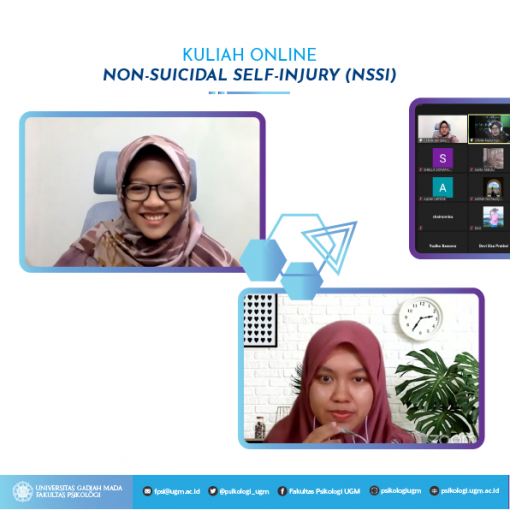
Friday (12/3) Center for Public Mental Health (CPMH), Faculty of Psychology UGM held an Online Lecture with the topic “Non-Suicidal Self Injury (NSSI)”. Previously, this material was delivered through WhatsApp Lecture (KulWap) which was then brought back through this event because there were more and more cases in the field related to NSSI. “So, we from CPMH want to raise it again, we open space for sharing and space for discussion, that’s about it”, said Wirdatul Anisa, M.Psi., A psychologist., As one of the speakers in this online lecture. Apart from Wirdatul, there is also Nurul Kusuma Hidayati, M.Psi., A psychologist. who is also a speaker.
The online lecture program this time started at 13.00 WIB and Wirdatul appeared as the first speaker to deliver the material. Wirdatul explained what NSSI is, “So if for example we talk about NSSI, NSSI is self-injurious behavior without any suicidal intentions.” The difference between NSSI and self-harm is that self-harm is self-injurious behavior with the intention of committing suicide, while NSSI is one thing that is done to overcome feelings that are difficult to manage and NSSI is part of self-harm. In addition, it is important to understand that NSSI is not a clinical diagnosis or mental disorder, such as bipolar or depression. However, NSSI is a risky behavior that requires further research.
Furthermore, this event also explained the reasons why people practice NSSI, one of which is poor emotional regulation. “However, perhaps the most basic when we talk about emotional regulation is how to improve it. That is the first thing to understand what our emotional patterns are like,” Nurul explained. Some people, according to Nurul, do not understand that these people have bad emotional regulation. Another thing that was also conveyed about the reasons why people do NSSI is the dominance of intrapersonal functions compared to interpersonal ones.
At the end of the event, the committee opened a question and answer session for the participants and one of the questions asked was about providing assistance when seeing someone doing NSSI, especially regarding listening without judgment. “Intending to actually listen to understand, actually what is being felt, what is he actually thinking, so that thoughts like that arise”, replied Wirdatul.
The hope of the speakers, when this topic is raised again, it can make people more informed about NSSI and more people will know about NSSI. It aims to create a supportive environment for one another.
